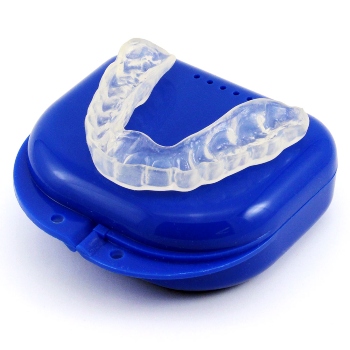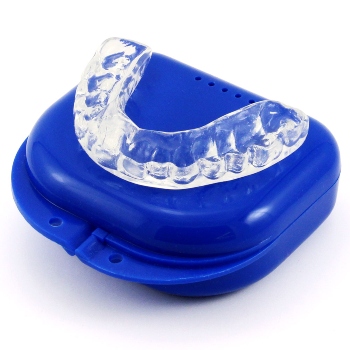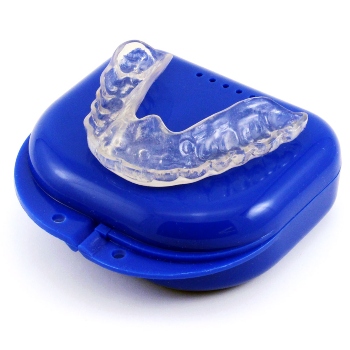According to research released by the American Dental Association, 10 to 15% of adults suffer from bruxism, a condition where you repeatedly grind and clench your teeth. Most people suffer from sleep bruxism, meaning they grind at night, although awake bruxism also occurs. This condition can cause a host of painful side effects if not treated: jaw pain, facial pain, broken or worn teeth, headaches, and earaches to name a few. “Occlusion” simply means tooth to tooth contact, so an occlusal guard aims to prevent this contact by creating a barrier between the teeth. An occlusal guard, also known as an occlusal mouth guard, occlusal night guard or a bite guard, can help ease grinding symptoms and protect your teeth and jaw from further damage.

Occlusal Splint vs. Occlusal Guard
Often, the terms splint and night guard are used interchangeably; however, these two devices are not necessarily the same. While guards and splints can perform some of the same functions, there are notable differences.
Occlusal guards are removable devices that fit over the teeth and are commonly called night guards, mouthguards, bite guards, and dental guards. Occlusal guards are an effective and noninvasive treatment option for bruxing that can prevent: jaw pain, headaches, worn or broken teeth, and more. An occlusal guard or night guard is a type of splint, but there are many types of splints that are not night guards.
An occlusal splint is an orthotic device designed to treat conditions such as TMJ (also known as TMD or Temporomandibular Joint Disorder). TMJ is a dysfunction of the jaw joint, resulting in pain of the jaw muscles, face, ears, head, and neck. In his book, Esthetic Dentistry in Clinical Practice, Marc Geissberger confirms the effectiveness of splints in treating TMJ: “Occlusal splints reduce elevator muscle contraction force by 80% in severe clenchers. Additionally, the utilization of an occlusal appliance may decrease pressure on the temporomandibular joint” (2010). There are different kinds of occlusal splints for different conditions and symptoms.

- Most Popular
- Hard Outside, Soft Inside
- 2MM Thick
- Moderate / Heavy

- Most Durable
- Hard Materials
- 1.5MM Thick
- Heavy / Severe

- For Day Time Use
- Thin, Barely Visible
- 1MM Thick
- Light / Moderate

- For Clenching
- Flexible & Soft
- 1.5MM Thick
- Light / Moderate
Types of Occlusal Splints
Types of occlusal splints for TMJ include:
Occlusal Guard/Night Guard:
There are different types of mouthguards which vary in material, cost, and durability. These guards are generally used to treat teeth grinding and clenching, release jaw tension, and prevent tooth damage.
Stabilization Splint:
Stabilization splints provide a biting surface which covers all of the teeth. When you attempt to grind, the upper teeth will be met with the splint, rather than the opposing teeth. The splint encourages the upper and lower jaw muscles to relax.
Repositioning Splint:
Repositioning splints serve an additional purpose; they reposition the jaw to correct the bite. These splints are used for those whose bruxism is influenced by a misaligned bite. If not treated, misalignment of the jaw can trigger severe TMJ pain.
NTI-tss Device:
The NTI-tss device differs from other splints in that it only covers the two top front teeth. By providing a barrier between the front upper and lower teeth, this device forces the jaw muscles to relax, stopping teeth grinding before it starts.
Consult your dentist if you believe you may need an occlusal splint because they will be able to identify which kind of splint is the best treatment option for you.
Related Articles:
Types of Occlusal Guards
Types of occlusal guards include:
Soft Night Guards:

Soft night guards are made of flexible, rubbery materials which make them perfect for light to moderate grinders. Researchers for the E-Journal of Dentistry explain, “Soft materials used for occlusal guards provide a more comfortable fit but are less wear resistant than their hard counterparts” (2012).
Hard Night Guards:

Hard night guards are made from a firmer and more rigid plastic to withstand the more severe grinding. This acrylic material is not pliable, although it makes for a more durable mouth guard.
Hybrid Night Guards:

Hybrid night guards (or dual laminate night guards) have a soft interior covered by a hard outer layer, making them perfect for moderate to heavy grinders.

How do you Know if you Need an Occlusal Guard?
The best way to determine if you need an occlusal guard is to identify your symptoms. You may want to consider using an occlusal guard if:
- You wake up feeling fatigued
- You often wake up with a headache or a toothache
- You suffer from sleep apnea
- You experience soreness in the jaw muscles or have jaw joint pain
- During a routine dental examination, your dentist noticed that your teeth have been ground down to a flatter surface than usual
- Your teeth start loosening, or you feel pain in your gums because of clenching
How do Occlusal Guards Work?
An occlusal guard provides a cushion between the upper and lower teeth which prevents teeth grinding. It also encourages the jaw muscles to relax, releasing tension and reducing jaw muscle soreness. The purpose of the occlusal guard is to:
- Prevent further tooth damage and gum recession
- Prevent wear on the surface of the teeth
- Relax the jaw
- Protect the jaw from joint problems that could develop over time
- Prevent headaches, earaches, and toothaches
- Promote healthy sleep patterns
While occlusal guards cannot cure you of your bruxism or TMJ, they can treat the problem and seriously reduce your symptoms while protecting you from further damage caused by long term teeth grinding.
Instructions for Wearing an Occlusal Guard
The American Sleep Association recommends you wear your night guard for at least 4-6 weeks to adjust to using it each night. It is important to wear it consistently and as recommended by your dentist to achieve pain relief as fast as possible. If your occlusal guard or splint causes you pain, it might not be fitted correctly, so you may need to take a new impression of your teeth and/or visit your dentist to have it adjusted. Dr. Edward Loev, DMD explains “2 weeks is about the average amount of time it takes to build a permanent habit” so expect to wear your occlusal guard for at least this much time before exploring other treatment options.
What are Occlusal Guards Made of?
An occlusal splint is usually made from processed acrylic resin. Custom-made occlusal guards are created from a few different materials. Most are made from EVA (ethylene vinyl acetate) which is a rubbery bendable material. Many studies have confirmed that this material is protective and useful in the construction of mouth guards. One such study notes, “EVA proved to be an adequate material for fabrication of mouthguards and interocclusal splints. In addition, EVA showed good results in force dissipation and demonstrated a shock-absorbing capacity and a great protection potential” (2007). Hard night guards are often made of resin crafted from a heat-cured acrylic, which is a very firm and durable material. Other materials include soft acrylic or light-cured composite. Read more on this subject in our article here “What Are Night Guards Made Of?”

Where can I Buy my Occlusal Guard?
Once you’ve decided that a custom fit occlusal guard is the right treatment option for you, there are two options to purchase: the dentist or an online retailer. When a dentist prescribes an occlusal guard, it will typically take two visits before you can receive the finished product:
- First visit: A mold is made of the patient's mouth. This might include both the top and bottom teeth, or simply one or the other. This mold is then sent to a lab that will make the guard to custom fit your teeth.
- Second visit: The dentist checks the guard’s fit and explains how to wear and take care of the guard.
When you purchase an occlusal guard from an online retailer, an impression kit is sent to you and you take an impression of your teeth yourself. You then send it to the dental lab where your custom fit guard will be crafted. It is then sent back to you and you wear it as needed.
There are also “one-size-fits-all” night guards which can be purchased over-the-counter, although these guards do not have the durability or customization that come with an occlusal guard from the dentist or online retailer. Additionally, these night guards are often ill-fitting.
How Much Does an Occlusal Guard Cost?
Occlusal guard prices vary based on the type of guard you purchase and where you purchase it from. A custom fit guard from a dental office will cost anywhere between $300 and $800. Alternatively, a custom fit night guard from an online retailer will cost between $100 and $200, and are also made in a dental lab. Occlusal splints for TMJ are typically more expensive because they serve unique purposes. These splints cost anywhere from $800 to $2,000.
Related Articles:

- Most Popular
- Hard Outside, Soft Inside
- 2MM Thick
- Moderate / Heavy

- Most Durable
- Hard Materials
- 1.5MM Thick
- Heavy / Severe

- For Day Time Use
- Thin, Barely Visible
- 1MM Thick
- Light / Moderate

- For Clenching
- Flexible & Soft
- 1.5MM Thick
- Light / Moderate
Final Thoughts
Bruxism and TMJ can leave you feeling fatigued, uncomfortable, and in pain. An occlusal guard or splint may be the solution to maintain your dental health. The best way to select the right dental appliance is to identify your symptoms, do your research, and have open communication with your dentist. Pro Teeth Guard provides high-quality custom fitted occlusal guards that are made in a dental lab and delivered right to your door. We are so confident in our products that we offer a 110% money back guarantee!
References:
- ASA Authors & Reviewers. (n.d.). Night Guard for Bruxism: Teeth Grinding and Clenching. American Sleep Association.https://www.sleepassociation.org/sleep-treatments/night-guard/.
- Coto, N. P., Dias, B., & Costa, R. (2007). Mechanical behavior of Ethylene Vinyl Acetate copolymer (EVA) used for fabrication of mouthguards and interocclusal splints. Research Gate. https://www.researchgate.net/publication/23495527_Mechanical_behavior_of_Ethylene_Vinyl_Acetate_copolymer_EVA_used_for_fabrication_of_mouthguards_and_interocclusal_splints
- Geissberger, M. (2013). Esthetic Dentistry in Clinical Practice. Wiley. https://books.google.com/books?hl=en&lr=&id=gSINAAAAQBAJ&oi=fnd&pg=PA307&dq=how+long+should+you+wear+an+occlusal+guard&ots=zySJjGRGbw&sig=T_wxBgW2F91oXXDXeHntkweNPJc#v=onepage&q=how%20long%20should%20you%20wear%20an%20occlusal%20guard&f=false.
- Kurtzman, G. M., & Mahesh, L. (2012). Utilization and fabrication of a hard-soft occlusal guard. EBSCOhost. https://web.b.ebscohost.com/abstract?direct=true&profile=ehost&scope=site&authtype=crawler&jrnl=22309489&AN=127504623&h=4XH4O4Ec%2f2kTSAi5kDz4L0raVSiSTpUSSagO9MdVfZ9vwUtFlmh63etBjAZkmIpHmtXg6dCra%2fFdpvWUaJUfCg%3d%3d&crl=c&resultNs=AdminWebAuth&resultLocal=ErrCrlNotAuth&crlhashurl=login.aspx%3fdirect%3dtrue%26profile%3dehost%26scope%3dsite%26authtype%3dcrawler%26jrnl%3d22309489%26AN%3d127504623
- Loev, E. (2017). Hate Wearing Your Night Guard (oral appliance)? I Did Too... Dr. Loev Blog. https://www.drloev.com/blog/hate-wearing-your-night-guard-oral-appliance-i-did-too